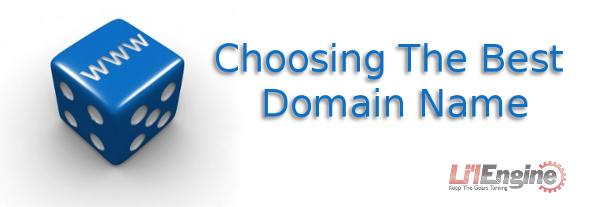Choosing a Domain – Age, Keywords, Hyphens, Etc.

Some people have the idea that the best domain name is the most generic, but that’s not always the case. In most cases, a domain name tied to your brand is better. Think about it. If you’re searching for a certain brand of organic pet food, a domain name matching that brand is going to be more intuitive to you than simply organicpetfood.com (which, as of this writing, is available). The name that you use to advertise your products is almost always the best name for your domain. People who don’t search will try this first in their browser, and if it matches, they’ll almost certainly remember it.
Domain Length
 That said, what about domain name length? They can be up to 67 characters long, so you don’t have to resort to obscure abbreviations or contractions of names. There are arguments both ways when it comes to length of domain name. Shorter domain names are more memorable, less susceptible to spelling errors, and easier to type. But on the other hand, sometimes longer domain names are easier to remember than unusual abbreviations or other shorthand names.
That said, what about domain name length? They can be up to 67 characters long, so you don’t have to resort to obscure abbreviations or contractions of names. There are arguments both ways when it comes to length of domain name. Shorter domain names are more memorable, less susceptible to spelling errors, and easier to type. But on the other hand, sometimes longer domain names are easier to remember than unusual abbreviations or other shorthand names.
It’s pretty well correct that all the “good” short domain names are taken. Don’t choose a domain name solely based on length. Short doesn’t guarantee memorability, but if your short name makes some kind of sense, then who’s to say? Long domain names with site keywords in them can be advantageous over shorter names without them. But don’t push the 67 character maximum too far. I mean, c’mon. That’s a lot of typing, and the more characters the greater the chance of a misspelling. Most people aren’t going to bother retyping a domain name that’s 50-something letters long, particularly if they’re not sure where they went wrong.
Making Sacrifices
The Holy Grail of domain names is one that is relatively short, memorable, easy to spell, and happens to be the same as the title to your site. But a lot of the time you will have to sacrifice one property for another. Having the site name the same as the domain name is generally a good idea. After all, remembering a URL and a site name that are different might be a little too much for the average web surfer.
If you can’t get the domain name of your choice, then what do you do? If you already have a brand that you’re known for, you shouldn’t just ditch it because you couldn’t get a matching domain name. Have you considered buying the domain name from the current owner? You can look up the “whois” information for the domain and contact the owner about it. Of course, they’ll probably try to make themselves a premium off the sale, but it could be a worthwhile investment. But if you’re just starting out, it may be better to obtain a good domain name first, and then name your website and build your brand around that. It’s not a workable solution in every case, but it is worth consideration.
To hyphenate or not to hyphenate? That is the question.
One advantage to the hyphenated domain name is that search engines can distinguish keywords better, resulting in a higher rank for those keywords that occur in your domain name. Also, the non-hyphenated form may not be available, and this is a way to still get the domain name you want.
Disadvantages to hyphenated domain name include the fact that it’s easy to forget that you need the hyphens, and visitors that forget the hyphens will almost certainly end up on your competitor’s site. Another disadvantage is that when people recommend your site by word of mouth, it’s easy to forget to mention the hyphens. Again, it could result in more potential customers going to competing sites. and a final disadvantage is that even very accomplished typists have trouble hitting the hyphen correctly every time.
If hyphens aren’t your thing, then you may be able to modify your domain name in other ways, like by adding “the” or “my” before the name. Often these forms are taken as well, so you may not get the chance. If you choose one of these alternatives with “the” or “my” or whatever, you have to always remember to promote your site with the full name, or else people will forget to affix it. Plural forms are, however, not such a good bet. People easily get confused, and there could be bad blood between you and the person with the singular form of the domain.
The Top-Level Domain
 OK, what about the suffix, which is officially called the top-level domain? Does it matter whether you choose .com, .org, or .net? What about other, less common suffixes like .de, .co.uk, etc.? Well, if you’re in Germany or the UK, then it makes sense to go ahead and get a top-level domain that is specific to your country. It could actually be to your benefit for locals to know that they are dealing with a domain that’s close by.
OK, what about the suffix, which is officially called the top-level domain? Does it matter whether you choose .com, .org, or .net? What about other, less common suffixes like .de, .co.uk, etc.? Well, if you’re in Germany or the UK, then it makes sense to go ahead and get a top-level domain that is specific to your country. It could actually be to your benefit for locals to know that they are dealing with a domain that’s close by.
If your perfect domain is perfect except for the top level domain, then go ahead and seriously consider .net or .org. Choosing a country specific domain could, however mislead people into thinking that your site is only specific to that country. One danger of having the .net or the .org top-level domain is that when people search on the first part of the domain, they will almost always get the .com version first, because this is the first one most browsers look for if there is not top-level domain specified. Again, this could result in missed opportunities.
The best situation is to get a domain name before starting your site if possible. It can be difficult to retrofit a site name to a domain and vice versa. But if that’s not a possibility, you do have other options for getting that best possible domain.







